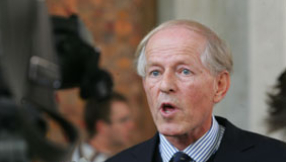Western policies fuelling persecution in Middle East - Archbishop
The Archbishop was speaking to 150 Christians at a BibleLands conference at Lambeth Palace to raise awareness of the plight of Christians in the Holy Lands and explore ways in which Western Christians can offer greater support.
In his address, Dr Williams warned that indigenous Christian communities right across the region had come under "appalling pressure" as a result of American and British global projects.
"Communities that have a history of coexistence have suddenly become antagonistic," he said, adding that the fall out had been the mass migration of Christians out of the region.
"At present, in the short-term, the pressures on so many of our Christian brothers and sisters in the Middle East are well nigh intolerable," he continued. "Migration, which in the 19th and early 20th century was a positive thing for Christians in the Middle East ... has now become a desperate measure to get away from an unbearable situation."
Dr Williams alleged that the ignorance of many Brits concerning the history and present situation of Christians in the Middle East had led to "unrealistic and unconstructive policies on both sides".
"I am aware of how much ignorance there is in our country and culture generally about Christians in the Middle East," he told the audience. "Even, dare I say, at the level of Government, it is remarkable how many people you come across who think that Christians arrived in the Middle East about 100 years ago."
Dr Williams urged Western Governments to recognise the effect that their foreign policy decisions were having on the region, and work to safeguard a plural Middle East in order to prevent radical forms of Islam from taking root.
"It is crucially important for the health of the region and the world that we don't assume that 'Arab' and 'Muslim' are equivalent terms," he said.
The history of Christian communities in the Middle East suggested, Dr Williams said, that Christians had the capacity "to be a presence that is creative and positive" in the Arab world.
"I would say that is what we must pray for and work for. If that is not the case, we do run the risk of a monochrome Islamic Middle East ... dominated by forms of Islam that are unfriendly to the Western world.
"We need to see a democratic, argumentative, interactive, creative society in that region, which will only come if all religious communities there - Christians, Muslims and Jews - are able to engage in that way."
He stressed that one of his "biggest anxieties" was the prospect of a Middle East without a "creative" Christian presence and in which Christianity's holy sites had become nothing more than museums.
"I think it's important to challenge the idea that the historic Christian communities in the Middle East are just museum pieces," he said.
"If the Holy Land itself, Syria, Iraq, Egypt, are not to be theme parks as far as Christianity is concerned, then Christians elsewhere in the world need to keep their responsibility, their awareness, keen."
Dr Williams highlighted the suffering of Iraqi Christian refugees who have sought refuge in neighbouring countries, particularly Syria, from a violent campaign being waged against Christians by Islamic extremists in Iraq.
"The state of those refugees is a matter of deep concern, indeed I would say a scandal," he said.
"We know the threats and pressures under which Iraqi Christians live. We know, therefore, how far away we are from a peaceful settlement and security within Iraq for all its communities.
"We know that so long as that continues the pressure is on for not only Iraqi Christians to leave but for other neighbouring countries to have to [help] in ways that they are not well equipped to do."
He added that the silence from Western governments over the plight of the Iraqi Christian refugees was "a real tragedy".
Dr Williams called on Western governments and Christian communities to help preserve Christianity in the Middle East.
"Christian communities have been a vital part of the political, social and cultural health of the Middle East.
"A region deprived of that contribution becomes a region more unstable, more open to the pressures of fanaticism, less able to deal with its own internal problems, less able to deal with the rest of the world," he warned.
"We should give as much effort as we are capable of to ensuring that that monochrome, inward-looking and inherently unstable future does not happen."
The conference announced a new scholarship to study the impact of migration among Iraqi Christians, supported by the Archbishop's Mission to the Assyrians, the Philip Usher Fund and the Anglican and Eastern Churches Association. In addition to this, the Nikaean Ecumenical Trust is giving a Bishop Buxton Bursary to two Syrian Orthodox deacons from Lebanon to study English in the UK for two months and to learn something of the church in the UK.













